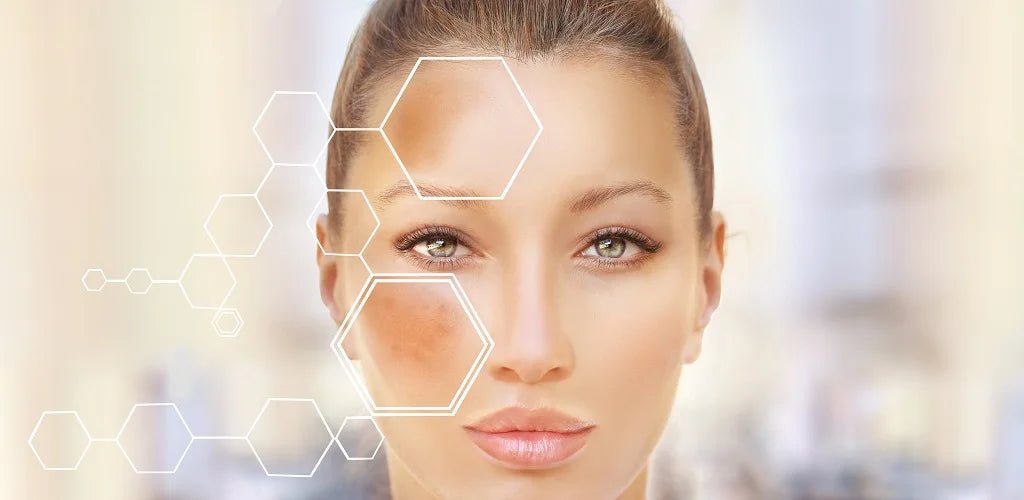
What Is Hyperpigmentation And How To Get Rid Of It?

Dr. Deepthi Prasad, MBBS.
Written by Our Editorial Team
Are you tired of hiding dark spots and patches on your skin? You are not alone! Hyperpigmentation is one of the most common skin concerns. Whether it's age spots from sun exposure, melasma from hormonal changes, or post-inflammatory pigmentation from acne, hyperpigmentation acne can be a real confidence-killer. You don't have to worry; there are ways to get rid of it! From topical creams and serums to professional hyperpigmentation treatments like chemical peels and lasers, various options are available to help lighten and even out your skin tone. So, no more hiding under makeup when you can have radiant, even-toned skin!
Our skin, hair, and eyes receive their color due to melanin pigment. There are 2 types of pigmentation:
- Hyperpigmentation: When the body produces excess melanin pigment, it is referred to as hyperpigmentation. Dark spots on your skin characterize hyperpigmentation.
- Hypopigmentation: When it produces less melanin pigment, it is known as hypopigmentation. Due to the reduced melanin production by the skin cell, your skin starts losing its color, resulting in hypopigmentation. Genetics, trauma, fungal infections, dermatitis, and skin inflammation are possible factors for hypopigmentation.
In this blog we will focus on the most common pigmentation type.i.e hyperpigmentation. Let's take a deep dive into hyperpigmentation causes and how to treat it.
What Is Hyperpigmentation?
Hyperpigmentation is a large, dark patch on the skin surface that appears due to excess production of melanin pigment. Melanin pigment is composed mainly of skin cells, and when the skin cells get damaged, melanin clump together to form dark patches. Those pesky, discolored patches on your skin are not very serious.
Also Read : Hyperpigmentation Be Gone : Ingredients That Help Fight Skin Discoloration
What Are The Causes Of Hyperpigmentation?

Hyperpigmentation can occur on the face or any other part of the body in the form of large patches or small spots on your face or other body parts.
1. Sun Damage
Exposure to harmful sun rays (UV rays) can damage the skin cells, resulting in early appearance of wrinkles, fine lines, and dark spots on the skin. It is also known as age spots, considering long-term exposure to the sun. The UV rays of the sun can damage the skin cells, causing melasma.
2. Damage To Skin Cells
Cuts, bruises, burns, rashes, acne, or any damage to skin cells can cause excess melanin production, resulting in dark spots.
3. Hormonal Changes
During pregnancy, your body undergoes hormonal changes. Pregnancy hormones sometimes cause the appearance of dark patches on the face.
4. Hyperpigmentation Acne
Hyperpigmentation acne or post-inflammatory hyperpigmentation in which the skin cells suffer inflammation, causing it to produce more melanin, resulting in hyperpigmentation.
5. Medical Conditions
An underlying health condition such as Addison's disease can result in hyperpigmentation.
Other causes of hyperpigmentation include aging and skin infections.
What Are The Types Of Hyperpigmentation?

There are 3 types of hyperpigmentation:
1. Age Spot Or Liver Spot
Dark color spots on the skin due to over-exposure to the sun are known as age spots. It usually affects exposed areas of the body.
2. Melasma
Melasma is also known as the mask of pregnancy. It often appears on the face, stomach, and forehead of pregnant women or those taking birth control pills.
3. Post-Inflammatory Hyperpigmentation
Dark spots or patches appear on the skin after an inflammatory condition such as eczema or acne. It is also known as hyperpigmentation acne.
How To Get Rid Of Hyperpigmentation?
Hyperpigmentation is not a cause for concern, but it can be disturbing as it is a cosmetic concern; hence people proactively look for hyperpigmentation remedies.
1. Topical Application Of Creams & Serums

Among the hyperpigmentation remedies, applying skin-lightening creams or serums is the most common and effective hyperpigmentation treatment many people adopt. You can effectively reduce hyperpigmentation using the right skin ingredients and a combination of skincare ingredients. Let's check out the ingredients to look for in your product.
- Niacinamide: Vitamin B3, or Niacinamide, is a potent skin-lightening ingredient effective in treating skin pigmentation. It has been clinically proven that Niacinamide lightens the dark spots and evens your skin tone, giving you clear skin. Try our Radiance Serum, which contains Cywhite (the world's most effective skin-brightening ingredient). It is infused with power-packed ingredients such as Cywhite, Niacinamide, Kojic Acid, and Azelaic Acid, which corrects your skin's imperfections, giving you visibly radiant and clear skin.
- Kojic Acid: It is also an effective skin-lightening ingredient that prevents melanin production by inhibiting the formation of tyrosine (an enzyme required for melanin production). Moreover, Kojic acid exhibits antimicrobial properties, which help to fight minor skin infections.
- Azelaic Acid: Azelaic acid is an excellent anti-inflammatory agent which soothes inflamed skin. It neutralizes the free radicals responsible for causing inflammation. It acts as a tyrosine blocker, which helps in pigmentation removal.
- Retinol: Retinol is the most admired skincare ingredient in the beauty world. It is a powerful anti-aging and anti-pigmentation agent. It helps in pigmentation removal by accelerating skin cell turnover.
Also Read : A Complete Guide On Retinol - Uses,Benefits And More
- Vitamin C: A powerful antioxidant that combats free radicals responsible for damaging skin cells, causing hyperpigmentation. It lightens dark spots and fades away hyperpigmentation, giving a more even-toned complexion.
2. Cosmetic Procedures
There are some in-office cosmetic procedures available to treat skin pigmentation, which include:
- Chemical peels
- Laser therapy
- Intense pulse light
You should speak to a dermatologist before opting for any anti-pigmentation cosmetic procedures and find the possible side effects.
3. Home Remedies

You can try out home remedies with natural ingredients readily available in your kitchen cabinet to treat skin pigmentation.
- Honey: Honey is a natural bleaching agent which reduces hyperpigmentation by fading away dark spots.
- Aloe Vera: Aloesin, a chemical compound found in aloe vera, is responsible for inhibiting melanin production.
Also Read : The Ultra Soother - Aloe Vera And Its Benefits For Skin
- Licorice: Licorice is a natural ingredient well-known for its skin-lightening property. Its anti-inflammatory, antioxidant, and healing properties revive damaged skin cells and improve cell regeneration.
- Green Tea: Green tea extract is a powerful anti-pigmentation ingredient as it is highly antioxidant, which fights free radicals, improving the skin conditions such as melasma.
There are numerous options to treat hyperpigmentation. It is essential to consult with a dermatologist to determine the best hyperpigmentation treatment for your skin concern. Additionally, incorporating sun protection and healthy skin care habits into your daily routine can help prevent hyperpigmentation from recurring. With the right approach, achieving a clean, clear, and even-toned complexion is possible.
About Doctor :

Dr. Deepthi Prasad specializes in Dermatology, Cosmetology, and Aesthetic Dermatology and has been practicing for over 15 years. After completing MBBS from Dr. NTR University of Health Sciences Andhra Pradesh in 2009, she earned a MD in Dermatology, Venereology & Leprosy from Osmania Medical College in Hyderabad in 2014.
Disclaimer:All the content published on www.thriveco.in is solely for information purposes. It is not a substitute for professional medical advice, diagnosis, or treatment. Always consider seeking the advice of your physician or a qualified healthcare provider. The information, suggestion, or remedies mentioned on this site are provided without warranty of any kind, whether express or implied.





 Buy 1 Get 1 Free. Use Code: BOGO
Buy 1 Get 1 Free. Use Code: BOGO






